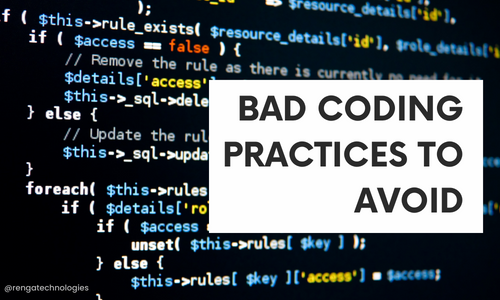
Bad Coding Practices to Avoid: A Guide for Developers
As a developer, writing clean, readable, and efficient code is crucial for creating software that is easy to maintain and debug. However, bad coding practices can easily creep into your work, leading to code that is difficult to understand and maintain. In this post, we will discuss 10 common bad coding practices and how to avoid them. Bad coding examples.
- Not commenting your code
Not commenting your code can make it difficult for others to understand what your code is doing and can also make it hard for you to remember what you did months or even weeks later. Make sure to include clear and concise comments throughout your code to help others understand it. A good rule of thumb is to include a comment before each function or class explaining what it does and to include comments in your code to explain any complex logic.
- Not testing your code
Not testing your code can lead to unexpected bugs and errors. Make sure to test your code thoroughly to catch any issues before you deploy it. This includes writing unit tests, integration tests, and functional tests to ensure that your code is working as expected.
- Not using version control
Not using version control can lead to lost or overwritten code. By using version control, such as Git, you can easily revert to a previous version of your code if something goes wrong. This also makes it easier for multiple developers to work on the same codebase and keep track of changes.
- Not optimizing your code
Not optimizing your code can lead to slow performance and long load times. Make sure to optimize your code by using efficient algorithms and minimizing unnecessary code. This includes using appropriate data structures, such as hash tables and trees, and avoiding complex algorithms where simple ones will suffice.
- Not following coding standards
Not following coding standards can make your code hard to read and understand. Make sure to follow the coding standards and conventions of the language you are using to make your code more readable and maintainable. This includes naming conventions, indentation, and commenting styles.
- Using global variables excessively
Using global variables excessively can lead to unexpected behavior and make your code harder to maintain. Make sure to use global variables only when necessary and to avoid using them as much as possible.
- Hardcoding values
Hardcoding values can make your code less flexible and harder to maintain. Make sure to use constants and variables instead of hardcoding values in your code.
- Not using error handling
Not using error handling can lead to unexpected behavior and make your code harder to debug. Make sure to include error handling in your code to catch and handle any potential errors.
- Not using modular code
Not using modular code can lead to long and complex code that is difficult to understand and maintain. Make sure to break your code into smaller, modular pieces to make it more readable and maintainable.
- Not documenting your code
Not documenting your code can make it difficult for others to understand how it works and how to use it. Make sure to include documentation in your code to explain how it works and how to use it.
In conclusion, avoiding bad coding practices is crucial for writing clean, readable, and efficient code that is easy to maintain. By following best practices and avoiding these common mistakes, developers can create code that is easy to understand, debug, and maintain, and that is less likely to contain bugs and errors.
